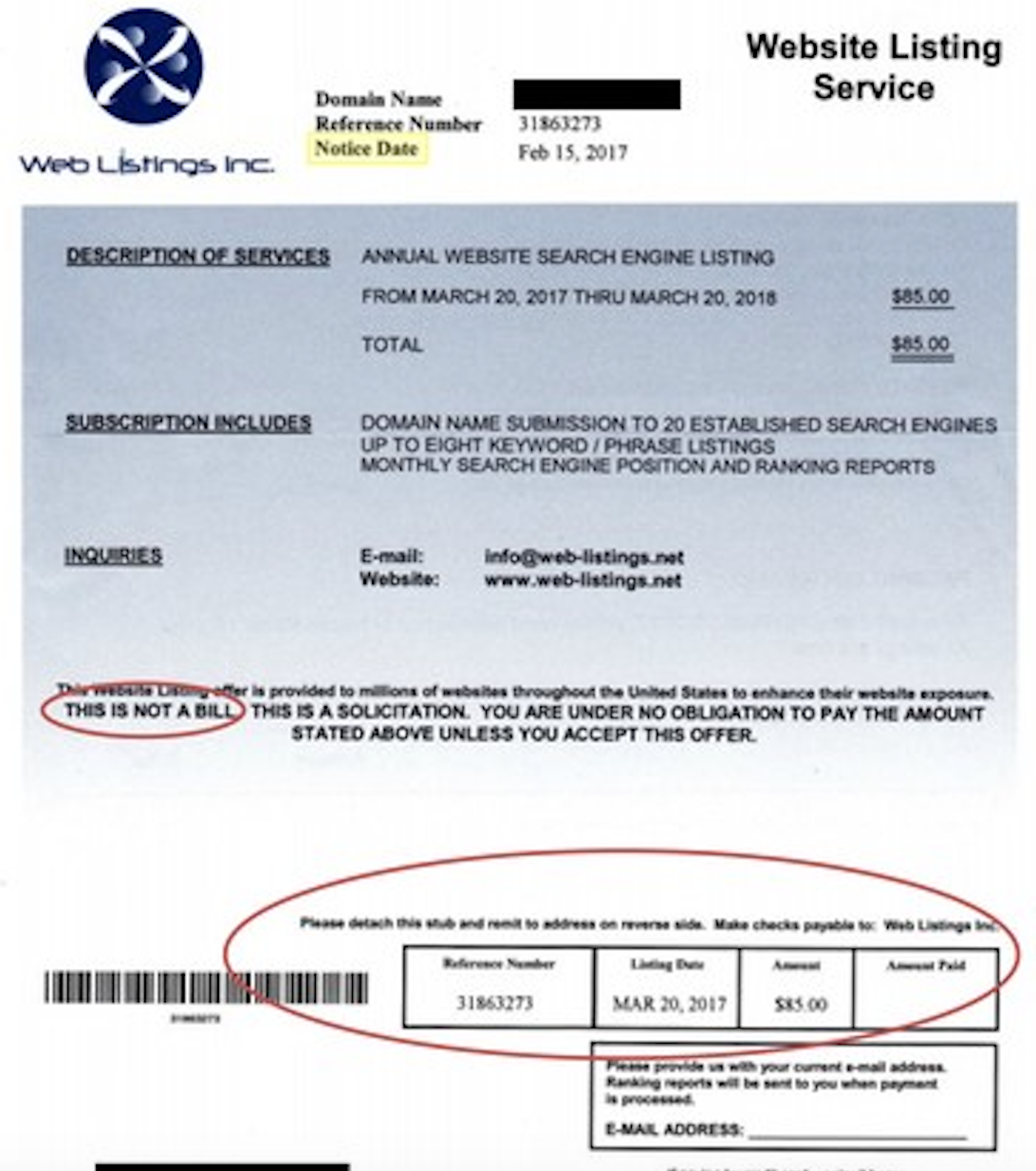Back in April 2015, I tweeted about receiving a letter via snail mail suggesting the search engine rankings for a domain registered in my name would suffer if I didn’t pay a bill for some kind of dubious-looking service I’d never heard of. But it wasn’t until the past week that it become clear how many organizations — including towns, cities and political campaigns — actually have fallen for this brazen scam.
The letter I tweeted about was from a company called Web Listings Inc., and it said I should pay a $85 charge for an “annual web site search engine” service.
The first clue that this was probably a scam was the letter said halfway down in capital letters “THIS IS NOT A BILL,” although it sure was made to look like one. Also, the domain it referenced was “fuckbriankrebs.com,” which was indeed registered using my street address but certainly not by me.
The sad truth is plenty of organizations *are* paying the people behind this charade, which is probably why Web Listings has been running it continuously for more than a decade. Most likely that’s because some percentage of recipients confuse this notice with a warning about a domain name they own that is about to expire and needs to be renewed.
We know plenty of people are getting snookered thanks to searchable online records filed by a range of political campaigns, towns, cities and municipalities — all of which are required to publicly report how they spend their money (or at least that of their constituents).
According to a statement filed with the Federal Election Commission, one of the earliest public records involving a payment to Web Listings dates back to 2008 and comes from none other than the the 2008 Hillary Clinton for President fund.
The documents unearthed in this story all came compliments of Ron Guilmette, a most dogged and intrepid researcher who usually spends his time tracking down and suing spammers. Guilmette said most of the public references he found regarding payments to Web Services Inc. are from political campaigns and small towns.
“Which naturally raises the question: Should we really be trusting these people with our money?” Guilmette said. “What kind of people or organizations are most likely to pay a bill that is utterly phony baloney, and that actually isn’t due and payable? The answer is people and organizations that are not spending their own money.”
Also paying $85 (PDF) to Web Listings was the 2015 campaign for Democrat Jim Kenney, the current mayor of Philadelphia.
A fund for the New York City Council campaign of Zead Ramadan (D) forked over $85 to Web Listings in 2013.
Also in 2013, the Committee to Elect Judge Victor Heutsche (D) paid $85 to keep his Web site in good standing with Web Listings. Paul T. Davis, a former Democratic state representative from Kansas handed $85 (PDF) to Web Listings in 2012.

Image: Better Business Bureau.
Lest anyone think that somehow Democratic candidates for office are more susceptible to these types of schemes, a review of the publicly-searchable campaign payments to Web Listings Inc. uncovered by Guilmette shows a majority of them were for Web sites supporting Republican candidates.
The Friends of Mike Turzai committee spent $65 in 2010 on the GOP Representative from Pennsylvania.
The fundraising committee for Republican Dick Black‘s 2012 campaign for the Virginia Senate also paid Web Listings Inc. $85. The campaign to elect Ben Chafin as a Republican delegate in Virginia in 2013 also paid out.
Robert Montgomery, a former GOP state representative in Kansas, paid $85 (PDF) to Web Listings in 2012.
Those in charge of the purse strings for the “Friends of GOP New York State Senator Tom Croci” fund paid $65 in 2011 to keep his political Web site full of search engine goodness.
Paying $85 each to Web Listings in 2012 were the judicial campaigns for Louisiana GOP Judge John Slattery, and Lynn Donald Stewart, who successfully got re-elected to the Nevada state assembly that year.
Perhaps the most reliable customers of Web Listings’ dubious services have been cities, towns and municipalities across the United States. Somehow, the people in charge of the purse strings for Simpson County, Kentucky paid $85 notices from Web Listings Inc. three years in a row (2016, 2017 and 2018).
Other state and local governments that paid Web Listings for their imaginary services include El Paso County in Texas; the city council of Watertown, S.D.; the City of Cudahy, Wisconsin; the Village of Bedford Park in Cook County, Illinois; the city council in Osawatomie, Kansas; the board of supervisors in Clarke County, Iowa; Lake County, Colorado; the Morenci Areas Schools in Morenci, Michigan.
Guilmette even found a number of bankruptcy cases where a creditor named “Web Listings, Inc.” was listed, with an amount owed being either the old price of $65.00 or else the new price of $85.00, including a creditor in the University General Health System, Inc. et. al. bankruptcy (PDF); Blue Ridge Wood Products Inc.; and an organization called Advanced Solids Control LLC (PDF).
A review of the complaints about Web Listings Inc. left over the past few years at the Better Business Bureau suggests that many recipients of this scam are confusing the mailer with a late payment notice from their domain registrar. As such, it’s likely this phony company has scammed a ridiculous number of consumers over the years, Guilmette observed.
“I’m sure they’ve conned a zillion other people who were spending their own money,” he said. “These are only the ones for which public records are available online.”
Stay tuned for Part Two of this story, which will look at some clues about who may be responsible for this long-running racket.
from
https://krebsonsecurity.com/2018/12/how-internet-savvy-are-your-leaders/
No comments:
Post a Comment